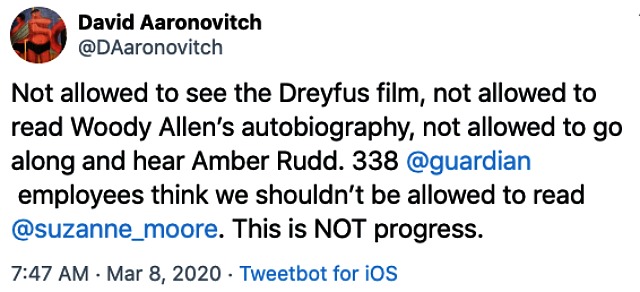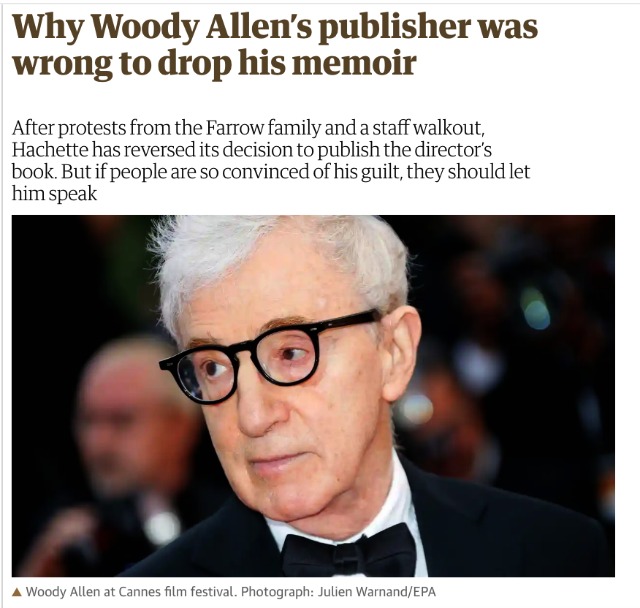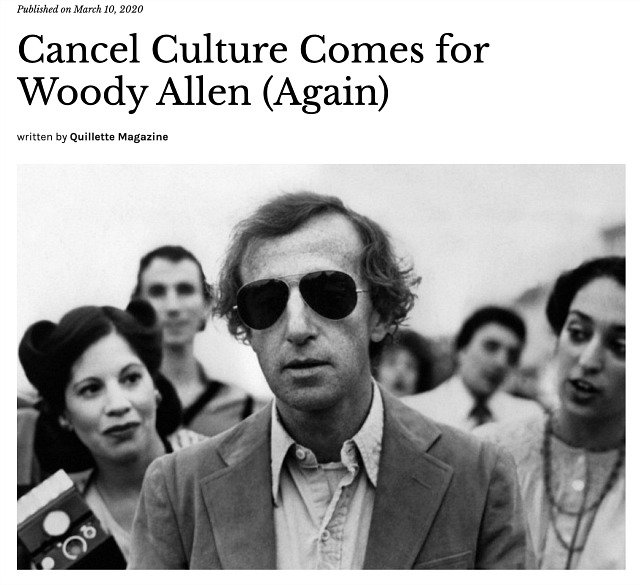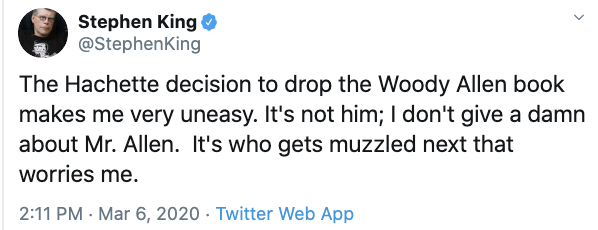Significant shock waves have resulted from the Dylan Farrow-supporting denialists forcing Hachette management to cancel the publishing of Woody Allen‘s “Apropos of Nothing.”
Is there anyone who believes that wokester mob rule has shown itself to be anything other than deranged and deplorable? The consensus in this instance seems fairly clear.
Except, it seems, among Indiewire staffers. I was noticing earlier today that despite all the Hachette hand-wringing no Indiewire staffer has posted any opinion about the cancelling of the Allen book. Indiewire‘s Ryan Lattanzio has reported the basics and quoted the Stephen King tweets about it, but that’s been the extent so far.




Please correct me if I’m wrong, but the implication seems to be that Indiewire has adopted a shoulder-shrugging attitude about this matter. They certainly don’t seem especially riled by it. I asked a couple of senior Indiewire editors about this earlier today. I gather there are differing views among staffers, and that there’s no official unifying viewpoint. Maybe so, but sometimes silence can betoken.
From “Cancel Culture Comes for Woody Allen (Again),” a Quillette essay posted on 3.10.20: “A fair assessment of Kobe Bryant is that he was one of the greatest players in the history of basketball, as well as someone who may or may not have sexually assaulted a woman in 2003. A fair assessment of Woody Allen is that he is a great and influential film director who also tore apart his extended family by entering into a very odd (but not illegal) sexual relationship with his ex-girlfriend’s adopted 21-year-old daughter.
“It would be perfectly normal for the same fans who turned their backs on Bryant in 2003 to eventually forgive him, and then cheer him on when he led the Los Angeles Lakers to championships in 2009 and 2010 — just as it would be perfectly normal for the same cineastes who lavish praise on Woody Allen’s oeuvre to remain unsettled by the origins of his marriage to Soon-Yi Previn, while also recognizing that the Mia-Dylan abuse allegations are nonsense.
“Which is to say that, morally speaking, most of us can walk and chew gum. We recognize that everyone is flawed and complicated, and that forgiveness is possible. True, such attitudes are anathema to the mob mentality. But most ordinary people aren’t part of mobs.
“It’s only on Twitter, a medium that self-selects for hair-trigger puritanism and moral hypocrisy, that mobs get to form a majority government. The problem comes when the firewall between the fake world of Twitter and the real world of human institutions breaks down, and social-media star-chamber verdicts are ratified by institutional gatekeepers.”
Cromwell: “Gentlemen of the jury, there are many kinds of silence. Consider first the silence of a man who is dead. Let us suppose we go into the room where he is laid out, and we listen: what do we hear? Silence. What does it betoken, this silence? Nothing — this is silence pure and simple. But let us take another case. Suppose I were to take a dagger from my sleeve and make to kill the prisoner with it; and my lordships there, instead of crying out for me to stop, maintained their silence. That would betoken! It would betoken a willingness that I should do it, and under the law, they will be guilty with me. So silence can, according to the circumstances, speak.”









